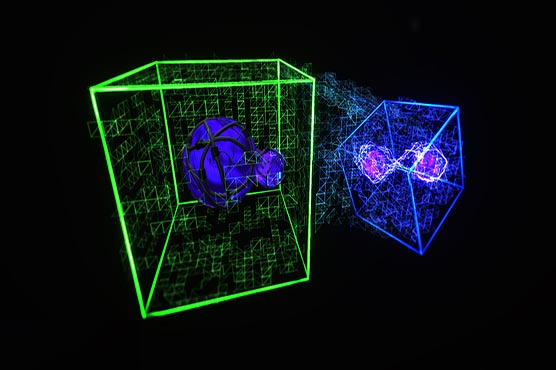Two paradoxical realities exist, quantum experiment proves

With their results, they were able to confirm the two realities described by Wigner held true.
(Web Desk) – A new study showed on Thursday that two versions of a reality are possible at the same time.
A mere thought posed years ago has been manifested as a reality, or more shall it say two realities by scientist.
This theory has been exemplified by the correct but different conclusions of two imaginary scientists.
This theory suggested that there is no thing such as objective reality as this practice calls into disputed fundamental questions about physics.
British team based at Heriot-Watt University set out to explore “Wigner’s friend”, named after Nobel prize-winning physicist Eugene Wigner who came up with it in 1961. He suggested that a particle of light or a photon can exist in two different possible phases.
Photon’s polarization spins both vertical and horizontal at the same time on the axis according to the superposition of quantum mechanics law.
For example, a scientist who is finding the photon’s polarization in an isolated lab is fixed at either horizontal or vertical whereas a person who is outside the lab and unaware of the photon’s polarization, the unmeasured photon is still in the state of superposition quantum.
Despite these apparently conflicting realities, both are correct.
In their new study, the physicists were able to bring this experiment into reality, using real photons and measuring equipment that stood in for Wigner and his “friend”.
With their results, they were able to confirm the two realities described by Wigner held true.
“You can verify both of them,” study co-author Dr Martin Ringbauer explained how this perplexed theory could make the jump from theory to reality.
“Theoretical advances were needed to formulate the problem in a way that is testable,” he said.
“Then, the experimental side needed developments on the control of quantum systems to implement something like that.”
As the results could be thousand miles away from our regular lives, it yet raises a profound sea of unsettling questions about the true nature of the reality.
“The scientific method relies on facts, established through repeated measurements and agreed upon universally, independently of who observed them,” the team wrote in their paper.
If measurements from this field cannot be considered absolute, it could change how the discipline operates.
“It seems that, in contrast to classical physics, measurement results cannot be considered absolute truth but must be understood relative to the observer who performed the measurement,” said Dr Ringbauer.
“The stories we tell about quantum mechanics have to adapt to that.”

